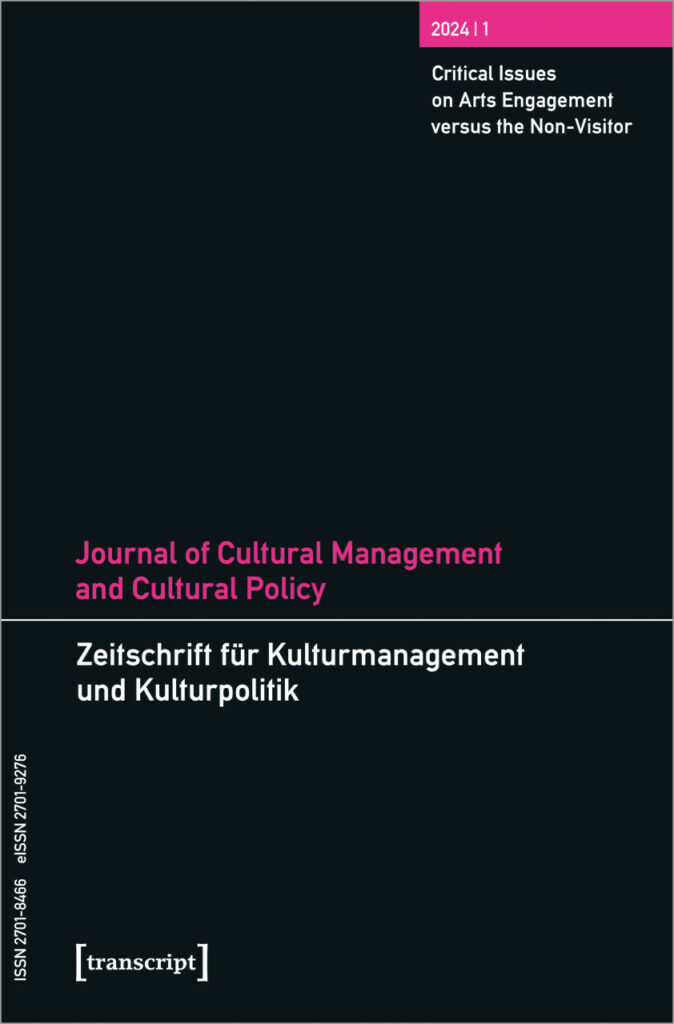Essay
Whose cultural capital? Towards an interdisciplinary understanding of cultural capital through cultural value
Abstract
Two articulations of cultural capital found in two disciplinary contexts are examined: one from Bourdieu’s sociology and one from Throsby’s cultural economics. These conceptions, it is argued, intersect in the notion of cultural value and need to be integrated. Bourdieu needs Throsby for cultural capital to be an object of decision-making but Throsby needs Bourdieu to make the definitional feature of cultural capital—cultural value—meaningful. This is because cultural value is not an aggregated sum of individual utilities the way economics conceives of value; but, and in line with Bourdieu, it is constituted through the collective meaning-making of situated social agents. Rather than a static, discrete object of measurement, cultural capital is a mutable and relational object of interpretation in social contexts and must be understood accordingly, before it can be calculated in economic terms. Cultural policy needs the humanities and sociology before it can make use of economics.
Keywords
2024 (1)
Critical Issues on Arts Engagement versus the Non-Visitor

Related Articles
Journal of Arts Management and Cultural Policy 2020 (1)
Research Article
Yearbook for Culture Management
Essay
Kulturelle Partizipation im Langzeitvergleich
Eine empirische Analyse am Beispiel der Stadt KölnYearbook for Culture Management 2012
Research Article
Money Talks
Über die Nichtneutralität von Geld in der KulturfinanzierungJournal of Cultural Management 2015 (2)
Research Article
Yearbook for Culture Management 2013
Research Article
Planning Creative Cities: Reflections on a Trend
Journal of Arts Management and Cultural Policy 2020 (1)
Essay
© 2026, Journal of Cultural Management and Cultural Policy
Keywords
- Aesthetics
- Higher Education
- Cultural Diplomacy and Foreign Cultural Policy
- Occupation
- Career and Professional Role
- Audience Development
- Audience Studies and Visitor Studies
- Visitor Motivations
- Business
- Covid Pandemic
- Democracy
- Digitalization
- Diversity
- Third Sector
- Empirical Aesthetics
- Development
- Ethics
- Evaluation
- Field Theory
- Festival
- Film
- Federalism
- Community Arts
- Societal Change
- Ideology
- Staging
- Career
- Communication
- Concert
- Creative Industries
- Creativity
- Crisis
- Culture
- arts organizations, cultural organizations
- Cultural Participation
- Cultural Change
- Fincancing The Arts
- Cultural Promotion Law
- Cultural History
- Cultural Management
- Cultural Economy
- Cultural Organizations
- Art Education
- Cultural Policy
- Cultural Production
- Cultural Sociology
- Art Education
- Cultural Understanding
- Arts Administration
- Cultural Industry
- Cultural Sciences
- Art
- Art Field
- Arts Research
- Artists
- Artistic Research
- Artistic Reputation
- Arts Management
- Arts Organizations
- Art education
- Arts Marketing
- Arts Administration
- Curating
- Leadership
- Literature
- Advocacy
- Management
- Marketing
- Market
- Media
- Methods Development
- Mexico
- Monumentalizing
- Museum
- Music
- Non-Visitor Studies
- Opera
- Orchestra
- Organization
- Political Expression
- Post-truth Politics
- Professional Role
- Audience
- Audience Development
- Law
- Government
- Role
- Socially Engaged Art
- Social Cohesion
- Social Change
- Social Cohesion
- Non-visitor Socio-demographics
- Socioculture
- State
- Symbolic capital
- Dance
- Participatory Justice
- Theatre
- Theatre Governance
- Theory Development
- Tourism
- Transformation
- Survey
- Entrepreneurship
- Urbanism
- Civil Society


